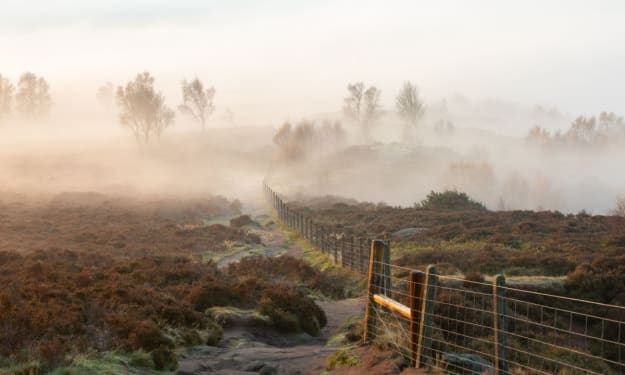
Joan -1972
Flower power, the War, Nixon's visit to China, Gordie Howe's retirement didn't mean much to Joan or any of the 200 residents of Bloomington, Idaho. The day's events arrived in the village, weeks later, through Spokane and Seattle newspapers that a traveling salesmen left. Bloomington was out of range of TV, and radio signals were cut off by mountains and Montpellier and Bear Lake Wilderness Reserves. Outsiders intruded occasionally, but 'Bloomers' stuck mostly to themselves. Everyone knew everyone's business, and there were lots of backyards and church step gossip, but the sleepy community abided with each other because their circles were small.
Joan didn't even realize that she was poor – everyone was in the same boat. The railway was in bad shape, and very little rolling stock traveled down the line from Montpellier south any longer. Every family had seen layoffs and hard times. Food wasn't plentiful but tasty and sufficient. Treats weren't typical. Apple pie in late summer and Christmas goodies were appreciated all the more. Trucks carried freight on Highway 89 but really only to connect with the I15 via Interstate 30. Nobody stopped in Bloomington. Why would they?
The shouting, drinking, and door slamming seemed normal until one morning, just before Joan's 13th birthday, when her mom announced, "your father has left, the son of a bitch, and he won't be coming back." He didn't. By the time she got to school, it seemed everyone in Bloomington was buzzing with the news. For seven years, no one paid much attention to her( even as she desperately hoped someone would notice her). Most days, she sat with Wanda MacKenzie and Shirley McLaughlin for recess and only spoke in class when one of the teachers asked her a question. Now, everyone, students and staff, took an interest in her – mostly pity from teachers and ridicule from the grade 7 and eight girls, but attention nonetheless. Whispers turned to taunts very quickly, and "your mother couldn't keep her man happy" was the most common refrain she heard for the next few days. For Mrs. Mattson and Mr. MacRae, Joan became a project, someone to nurture and dote on. The favoritism didn't sit well with her or her classmates, but it was better than the bullying.
At home, her mom became defensive about everything from chores, money, the weather, and Joan's questions. "Why do we fight all the time?" She never answered, never explained. She stopped going out and didn't have anyone to talk with.
School eventually became bearable but in June, what was left of her family began moving west. The first stop was Pocatello, where mom got a job, as a cook, with the Idaho Department of Corrections. Within a month, a string of sweaty men began parading through their little rented house. Some were around in the morning but never for supper. Joan was back in school- grade 9 and mostly blended into the woodwork. "No one notices me in the big city. No one knows my stuff." she wrote in the only letter she sent to Wanda (even though they tearfully promised to be friends forever). Home, school, and in between was all she knew, all she wanted to know. She didn't even notice the walk home most days, but instead, she drudged the 4 blocks with her head down. Then she met Garrett Andrew Wilkie, a senior at Pocatello High School. Walking home on Friday afternoon, a car pulled up beside her. She didn't know cars, but this one was white, and she recognized the driver – Garrett Wilkie. "Do you want to come to the Poky Pride rally with me and Tim?" he shouted over the rumble of the exhaust. "Who is he talking to?" wondered Joan and then realized there was no one else on the road. "It must be me." "What?" she strained as she tried to gain some composure.
"Do you want to come with us to the rally?" he said deliberately as if he thought she was a bit slow. "Yes, thanks." She stuttered more out of something to say rather than a desire to join them. Immediately, Tim was out the door holding the seat forward so she could crawl into the back seat. The rest of that evening and the weekend is a bit of a blur. Garrett was a perfect gentleman, introducing her to his friends, buying her a pop at the rally, asking her to the game "Poky won, I think.", and driving her straight home afterward. "Can I see you tomorrow?" he asked sheepishly (or what she took for sheepish). "Sure." She said quickly, this time because she really wanted to see him.
Over the next two weeks, Joan became a minor celebrity. She was in Garrett's presence all the time that she wasn't in class. He was popular, so she was popular. They sat together, they rode together, they talked together. On the second Friday after the rally, Garrett took her to a party outside of town. This was the first time Joan tasted beer – it was awful, but she didn't let on. "I remember kissing him and feeling him press against me." "I remember saying No, No, No" "I remember hearing him say, "See, just like her mom. I got her to spread her legs in just two weeks. You owe me ten bucks." Then, nothing else.
Joan didn't stay at the same school for a full year through high school; six schools in four years. They kept moving west.
♀♀
1974 – Wenatchee, Washington
Apple blossoms and their fragrance that enters through your eyes should make you smile. Not much smiling happened in grade 12. In the midst of new growth, everything felt dead.
About the Creator
Bob McInnis
I am therefore I ask questions. Lately, my questions have been about our survival as a species, our zealous and unrealistic quest for freedoms, and what appears to be an aversion to responsibilities.






Comments
There are no comments for this story
Be the first to respond and start the conversation.